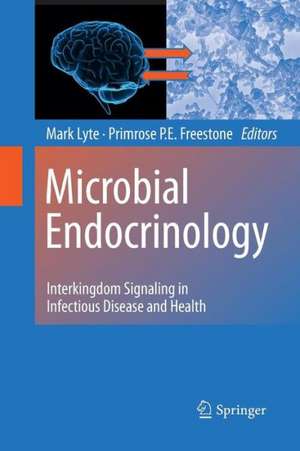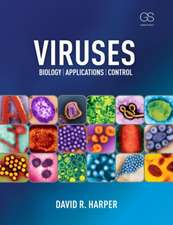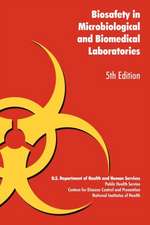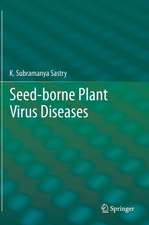Microbial Endocrinology: Interkingdom Signaling in Infectious Disease and Health
Editat de Mark Lyte, Primrose P. E. Freestoneen Limba Engleză Paperback – 6 noi 2014
Preț: 1474.80 lei
Preț vechi: 1552.41 lei
-5% Nou
Puncte Express: 2212
Preț estimativ în valută:
282.29€ • 306.74$ • 237.28£
282.29€ • 306.74$ • 237.28£
Carte tipărită la comandă
Livrare economică 21 aprilie-05 mai
Preluare comenzi: 021 569.72.76
Specificații
ISBN-13: 9781489984197
ISBN-10: 1489984194
Pagini: 332
Ilustrații: XVI, 316 p.
Dimensiuni: 155 x 235 x 17 mm
Greutate: 0.47 kg
Ediția:2010
Editura: Springer
Colecția Springer
Locul publicării:New York, NY, United States
ISBN-10: 1489984194
Pagini: 332
Ilustrații: XVI, 316 p.
Dimensiuni: 155 x 235 x 17 mm
Greutate: 0.47 kg
Ediția:2010
Editura: Springer
Colecția Springer
Locul publicării:New York, NY, United States
Public țintă
ResearchCuprins
Microbial Endocrinology: A Personal Journey.- Evolutionary Considerations of Neurotransmitters in Microbial, Plant, and Animal Cells.- Mechanisms by Which Catecholamines Induce Growth in Gram-Negative and Gram-Positive Human Pathogens.- Dietary Catechols and their Relationship to Microbial Endocrinology.- Interactions Between Bacteria and the Gut Mucosa: Do Enteric Neurotransmitters Acting on the Mucosal Epithelium Influence Intestinal Colonization or Infection?.- Modulation of the Interaction of Enteric Bacteria with Intestinal Mucosa by Stress-Related Catecholamines.- The Role of Microbial Endocrinology in Periodontal Disease.- Staphylococci, Catecholamine Inotropes and Hospital-Acquired Infections.- The Microbial Endocrinology of Pseudomonas aeruginosa.- Mechanisms of Stress-Mediated Modulation of Upper and Lower Respiratory Tract Infections.- Psychological Stress, Immunity, and the Effects on Indigenous Microflora.- The Epinephrine/Norepinephrine/Autoinducer-3 Interkingdom Signaling System in Escherichia coli O157:H7.- Molecular Profiling: Catecholamine Modulation of Gene Expression in Enteropathogenic Bacteria.- Microbial Signaling Compounds as Endocrine Effectors.- Mycologic Endocrinology.- Experimental Design Considerations for In Vitro Microbial Endocrinology Investigations.
Textul de pe ultima copertă
About this book
Microbial endocrinology represents a newly emerging interdisciplinary field that is formed by the intersection of the fields of neurobiology and microbiology. It is the intent of this book to introduce a new perspective to the current understanding not only of the factors that mediate the ability of microbes to cause disease, but also to the mechanisms that maintain normal homeostasis. The discovery that microbes can both synthesize and directly respond to neuroendocrine hormones provides for a new framework with which to investigate how microorganisms interface not only with vertebrates, but also with invertebrates and even plants.
The reader will learn that neuroendocrine hormones, most commonly associated with mammals, are actually found throughout the plant, insect and microbial kingdoms to an extent that will undoubtedly surprise many, and most importantly, highlight how interactions between microbes and neuroendocrine hormones influence health and the pathophysiology of infectious disease. This book will lead its readers to the understanding that through eons of association with eukaryotic organisms, bacteria have evolved specific detection systems for neuroendocrine hormones, which they utilize not only to "sense" their environment, but also to co-op products of neurophysiological responses for their own survival.
About the Editors
Prof. Mark Lyte, Ph.D., M.S., MT(ASCP) is a Professor in the Department of Pharmacy Practice, and adjunct Professor in the Departments of Internal Medicine and Microbiology and Immunology, Texas Tech University Health Sciences Center. Prof. Lyte conducted experiments in 1991 that subsequently led him shortly thereafter to propose and found the field of microbial endocrinology. In addition to having served on scientific review panels for the National Institutes of Health and other worldwide agencies, Prof. Lyte has been awarded the Joseph Susman Memorial Award for Surgical Infectious Disease Research and was named a finalist for the NIH Director’s Pioneer Award.
Dr. Primrose Freestone, BSc(Hons), PhD, PGCE is a Lecturer in Clinical Microbiology, in the Department of Infection, Immunity and Inflammation, University of Leicester. Dr. Freestone was the first to identify tyrosine phosphorylation as a regulatory mechanism in bacteria, and to elucidate the mechanisms by which stress hormones induce bacterial growth. She is also an inventor in the fields of microbial diagnostics and dietary bioactives, and has been awarded Fellowships to develop entrepreneurial activities in life science biotechnology.
Microbial endocrinology represents a newly emerging interdisciplinary field that is formed by the intersection of the fields of neurobiology and microbiology. It is the intent of this book to introduce a new perspective to the current understanding not only of the factors that mediate the ability of microbes to cause disease, but also to the mechanisms that maintain normal homeostasis. The discovery that microbes can both synthesize and directly respond to neuroendocrine hormones provides for a new framework with which to investigate how microorganisms interface not only with vertebrates, but also with invertebrates and even plants.
The reader will learn that neuroendocrine hormones, most commonly associated with mammals, are actually found throughout the plant, insect and microbial kingdoms to an extent that will undoubtedly surprise many, and most importantly, highlight how interactions between microbes and neuroendocrine hormones influence health and the pathophysiology of infectious disease. This book will lead its readers to the understanding that through eons of association with eukaryotic organisms, bacteria have evolved specific detection systems for neuroendocrine hormones, which they utilize not only to "sense" their environment, but also to co-op products of neurophysiological responses for their own survival.
About the Editors
Prof. Mark Lyte, Ph.D., M.S., MT(ASCP) is a Professor in the Department of Pharmacy Practice, and adjunct Professor in the Departments of Internal Medicine and Microbiology and Immunology, Texas Tech University Health Sciences Center. Prof. Lyte conducted experiments in 1991 that subsequently led him shortly thereafter to propose and found the field of microbial endocrinology. In addition to having served on scientific review panels for the National Institutes of Health and other worldwide agencies, Prof. Lyte has been awarded the Joseph Susman Memorial Award for Surgical Infectious Disease Research and was named a finalist for the NIH Director’s Pioneer Award.
Dr. Primrose Freestone, BSc(Hons), PhD, PGCE is a Lecturer in Clinical Microbiology, in the Department of Infection, Immunity and Inflammation, University of Leicester. Dr. Freestone was the first to identify tyrosine phosphorylation as a regulatory mechanism in bacteria, and to elucidate the mechanisms by which stress hormones induce bacterial growth. She is also an inventor in the fields of microbial diagnostics and dietary bioactives, and has been awarded Fellowships to develop entrepreneurial activities in life science biotechnology.
Caracteristici
The first comprehensive book in the field of microbial endocrinology Provides new insight into the interactions between microbes and hormones Research into this area has widespread implications for medicine and industry, including drug development Includes supplementary material: sn.pub/extras





